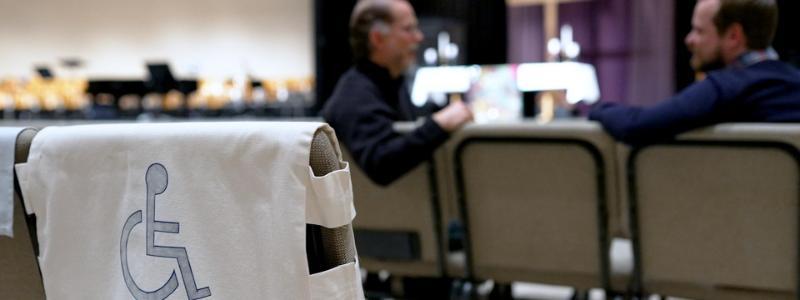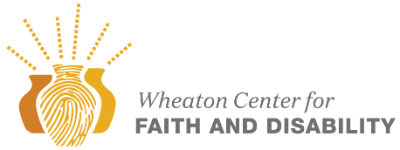
Indispensable Weakness
A new movement seeks to build the Church by drawing on the power of God’s strength, made perfect in weakness. Learn how your church can take part.
By Katherine Anderson
At a church in Wheaton, Illinois, pastors and parents have begun taking intentional steps toward becoming a community where 1 Corinthians 12: 22 comes to life, and “those parts of the body that seem to be weaker” are truly treated as indispensable. What does this mean? And how can other churches begin becoming places of belonging for the almost 20 percent of the population living with disabilities?
Dr. Thomas Boehm, founding director of Wheaton’s Center for Faith and Disability, hosted the first Disability Convocation this spring with hopes that this type of meeting might become a prototype—and churches everywhere might better model and mirror the love of God.
Instead of a new program, Dr. Boehm’s Disability Convocation focuses on working with the church leadership to build and deepen existing relationships among leaders and families within each individual church. It included Pre-Convocation activities to prepare and unify hearts for the one-day event. Prioritizing relationship-building over program-building, this new church engagement model included worship, testimony, discussion, and prayer.
The day began with a circle in the sanctuary that included almost every member of the pastoral team and staff, and multiple parents of children of different ages with various disabilities. Four families came prepared to share with the group about the positives and negatives of their experiences with disability, their experiences in the church, and their vision for the future. Church leadership came prepared to listen and respond more from the heart than the head.
The Convocation created space and time to hear each family’s story. Griefs were laid bare, and challenges detailed. An 11-year-old son had never been in a stable school situation. A 15-year-old son’s catastrophic physical injuries seemed small when compared with the insurmountable burden of his grief, as he struggled to accept a new life he didn’t want. A family described their experience with disability as a “bomb going off” in the middle of their home, changing everything about family life. During one of the sharing times, one mom said, “I don’t think you realize how rare it is for anyone to listen to our story. We are in our 26th year of walking this journey, and people have never asked.”
The day also included unifying times of corporate worship, prayer, and processing the realities of both the burdens and blessings associated with disability. Time was also set aside for prayer in small groups and private time for journaling and scripture meditation. The day closed with everyone offering short reflections on what God was saying to them during the Convocation and how they sensed God calling their community to grow. Some voiced felt needs, whether for respite or for greater understanding from the church community, and others shared encouraging stories and hopes for the future.
Nancy, mother of an adult child who attended the Convocation, shared lessons she had learned over the years about helping people with disabilities get involved at church. She said, “It really requires intentionality. Not everybody gets how to be intentional. You must listen and understand what the person wants to do, address the barriers to participation, and then provide ongoing support.” Her son, Matthew, was asked to help hand out bulletins but wanted instead to serve communion. Church leaders addressed barriers and Matthew is now serving communion. “I cry when he serves me, so sometimes I need to not go to him,” Nancy says, adding, “Almost every time he serves, people I know or even people I don’t know come up and tell me how blessed they are at having him serve them communion.”
Nancy has volunteered in the church’s youth ministry for years and noted changes in attitudes were already taking place. One teen, so excited by the Lord’s work during Easter week went to the front of his youth group and started singing and saying, “Hallelujah, the Lord is Risen.”
“The whole youth group answered him, they all screamed Alleluia,” Nancy said, adding, “This would have never happened five years ago. They entered his joy and rejoiced with him. Something has already happened to change the way he was received.”
During a time of reflection, a key ministry leader voiced what many felt—a movement from hopelessness to hope over the course of the day. Furthermore, he voiced the dream that one day the entire congregation would begin “to grasp the gifts that people with disabilities bring to the church.”
This same leader noted he has seen disability help to destroy people’s idols (of perfectionism, of human rather than divine control, of self-mastery), and as a wonderful spiritual blessing. “We may appear powerless, but there is great spiritual strength in disability,” he said. He called on church leaders to seek out those with disabilities to lead and teach others how to begin and sustain this work.
Dr. Boehm’s hope is that through more intentional gatherings and relationship building, as well as the more traditional preaching and teaching, one day everyone in every congregation will come to understand that those with disabilities are vital parts of the body of Christ, and church life would reflect an understanding of 1 Corinthians 12:18: “God has placed the parts in the body, every one of them, just as He wanted them to be.”
